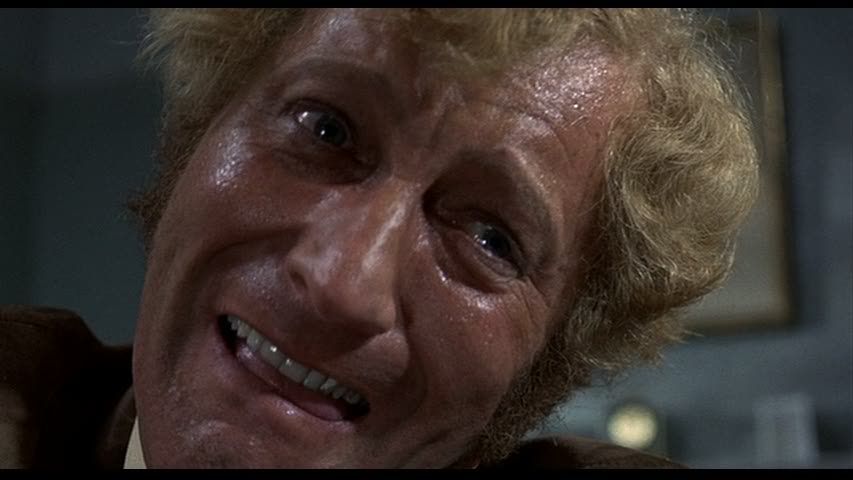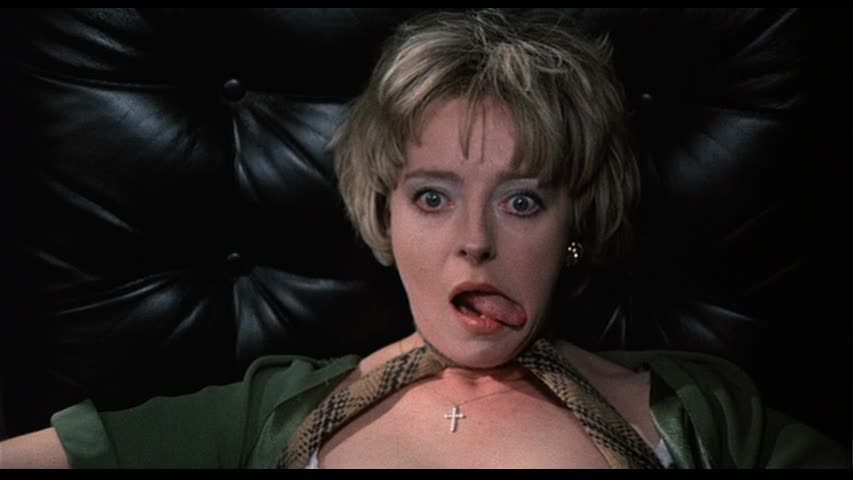
Alfred Hitchcock's penultimate film, Frenzy, was also his return to his native England after a lengthy absence. The familiar territory seems to have done him some good, as Frenzy is a self-assured, energetically made film. It's certainly an improvement on his previous two pictures, Torn Curtain and Topaz, undeniable low points in which the director seems to have been only sporadically engaged by his own material, demonstrating mere flashes of his previous brilliance. Which is not to say that Frenzy returns Hitch to the top of his form, but it does display his characteristic wit and verve, his morbid humorous streak and eye for striking compositions; despite the subject, one of the suspense master's darkest, Hitch actually seems to be having fun again.
Of course, this fun is problematic, since the film is about a sexual deviant raping and killing women in London. Hitch has a rather perverse idea of fun, and this is perhaps the film that most clearly displays his own deviancy: his ambivalence towards women, his simultaneous repulsion from and fascination with sex, his masochism towards his characters. In many ways, Hitchcock's own perspective on this material is best represented by the early scene in which a group of pub patrons discuss the "necktie murders" and speculate about what's going on. They're clearly excited and particularly interested in the sexual component of the crime. An elderly bar maid seems almost turned on when she asks a customer, "he rapes them first, doesn't he?" A pair of customers, meanwhile, trade quips about the murders before one of them concludes that the whole thing is good for tourism: "Foreigners somehow expect the squares of London to be fog-wreathed, full of hansom cabs and littered with ripped whores, don't you think?" One can sense Hitchcock's dry, morbidly blunt wit in these lines, and in many others like them scattered throughout the film. Not since The Trouble With Harry has Hitch joked so blithely about death.
But this is a much darker film than The Trouble With Harry, in which the titular corpse was merely an inconvenience for a group of easygoing country folk. Frenzy is decidedly more ambivalent about death: Hitchcock's gallows humor rubs uncomfortably up against some of the most startlingly violent sequences in his entire filmography, scenes reminiscent in their grim, realistic violence of the brutal farmhouse assassination at the center of Torn Curtain. The two different approaches to violence are apparent even in the very first scene, in which, after Hitch's roving camera pans majestically down the length of a London river during the credits, he takes up a vantage point looking down at a politician's speech. The speech, about purifying the river of its pollution and garbage, is interrupted when the body of a naked woman comes floating up to shore; the scene is both bitterly ironical and horrifying.
Later, there's certainly no trace of this dark humor in the scene where the necktie killer, Bob Rusk (Barry Foster) rapes and then strangles a young woman named Brenda (Barbara Leigh-Hunt). Hitch shoots the scene almost entirely in alternating closeups between the increasingly sweaty, contorted face of the killer and the dispassionate look on Brenda's face as she's raped, quietly reciting prayers and trying to distance herself from what's happening to her. The scene is horrifying, as much for its small details as anything: Hitch inserts closeups of Bob removing his victim's bra and then, later in the scene, another of her discretely covering up again, trying to salvage her dignity even in the midst of a rape. The actual murder is then filmed in tight closeups, cutting briskly between the killer's distorted face and his victim's gasping sputterings, her hands scraping at the tie wrapped around her throat. Hitchcock caps off this horrific sequence with a shot of Brenda's corpse, the tie still wrapped around her throat, her mouth gaping open with her tongue sticking off to the side. It's a cartoonish, grotesque image, following up on the queasy horror of the rape and murder itself, and visually it rhymes with the closeups of Bob during the murder, his tongue protruding slightly from between his lips in his excitement. The whole sequence is one of Hitchcock's most unsettling and explicit, replacing the artful misdirection of many of the master's earlier films — like the famous shower scene in Psycho — and instead forcing his audience to confront this violence directly: face to face, as it were.

In spite of the especially dark and lurid approach to the violence, in other ways the film is familiar territory for Hitchcock. It's a "wrong man" thriller, since the murdered Brenda is in fact the ex-wife of down-and-out former military man Dick Blaney (Jon Finch). Blaney is the focus of the film's opening, as he loses his job as a bartender, flirts with his girlfriend Babs (Anna Massey), and goes to visit his ex-wife, having several very public arguments with her that will, to say the least, look very bad when she's murdered the next day. Naturally, Blaney instantly becomes the top suspect as the necktie killer, and he goes into hiding while trying to figure out how to clear his name and catch the real murderer. Actually, though, in many ways Hitchcock seems to be only going through the motions of his usual wrong man storyline, perhaps because Finch is such a bland actor and Blaney such an uninteresting, unsympathetic everyman hero, a whiny jerk who treats the women in his life rottenly. Hitchcock seems much more interested in the charming but sinister Bob, who occasionally slips subtle misogynist comments into his conversations, indications of the inner darkness that otherwise only appears during his murders; mostly, he's a well-respected businessman, running a fruit stand where he chats amiably with everyone in the neighborhood.
Hitchcock also gets a lot of fun out of the Scotland Yard detective investigating the case, Inspector Oxford (Alec McCowan). This fine chap doesn't seem to do much actual policework, mostly just hanging around thinking and waiting for the solution to fall into his lap, which eventually of course it does. In the meantime, Hitchcock takes great delight in the inspector's domestic dilemma: Oxford's wife (Vivien Merchant) has developed a passion for gourmet cooking, and has stopped making the simple, substantial meals he enjoys, opting instead for bizarre delicacies like a grotesque-looking soup with huge chunks of black and tentacled seafood floating in its murky broth, or pigs' feet served in a creamy white sauce, or tiny little roast birds with virtually no meat on them. Hitchcock lingers over these odd, unappetizing meals, and the inspector's teeth-gritted reaction as he struggles to choke them down (or dispose of them otherwise) without indicating his displeasure to his wife. The food is baroque and ugly, and as he eats the inspector invariably discusses the particulars of his case, adding to the nauseating quality of these scenes.
Food and murder are also mixed memorably in an outlandish sequence in which Bob, after murdering a woman, realizes that she had grabbed a potentially incriminating tie pin off his jacket and still held it in her rigor mortis death grip. The trouble was, he'd just thrown her in a sack of potatoes and left her in the back of a truck, and when he goes back out to retrieve the pin, the truck driver heads off onto the road with Bob and the body still in the back. The scene is staged as an almost comic suspense sequence, which is interesting since it places the audience in the position of rooting for the killer to hide the evidence of his horrible crime. The driving score suggests suspense, but the action of the scene itself is absurd, as Bob digs through a bag of potatoes, trying to uncover the body, getting the stiff feet rammed into his face, scrambling among rolling potatoes, and finally finding that the girl's hand is wrapped so tightly around the pin that he has to actually break her fingers one by one to retrieve the evidence. It's just another example of how unusual Hitchcock's perspective on death is here: he certainly has no respect for the dead, no discretion, and his portrayals of death are messy and ugly and brutal, as well as somewhat silly. Maybe that's the point, that there's no dignity in death, no sense in appealing to "good taste" when it comes to such horrid things. Instead, he wallows in the ridiculous and horrifying aspects of these crimes, never flinching away no matter what happens.








0Awesome Comments!